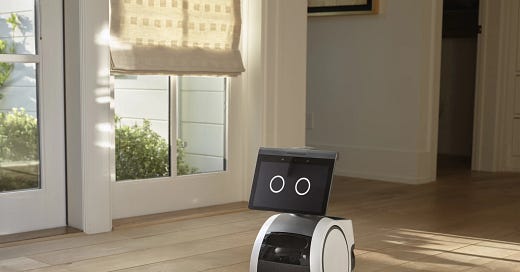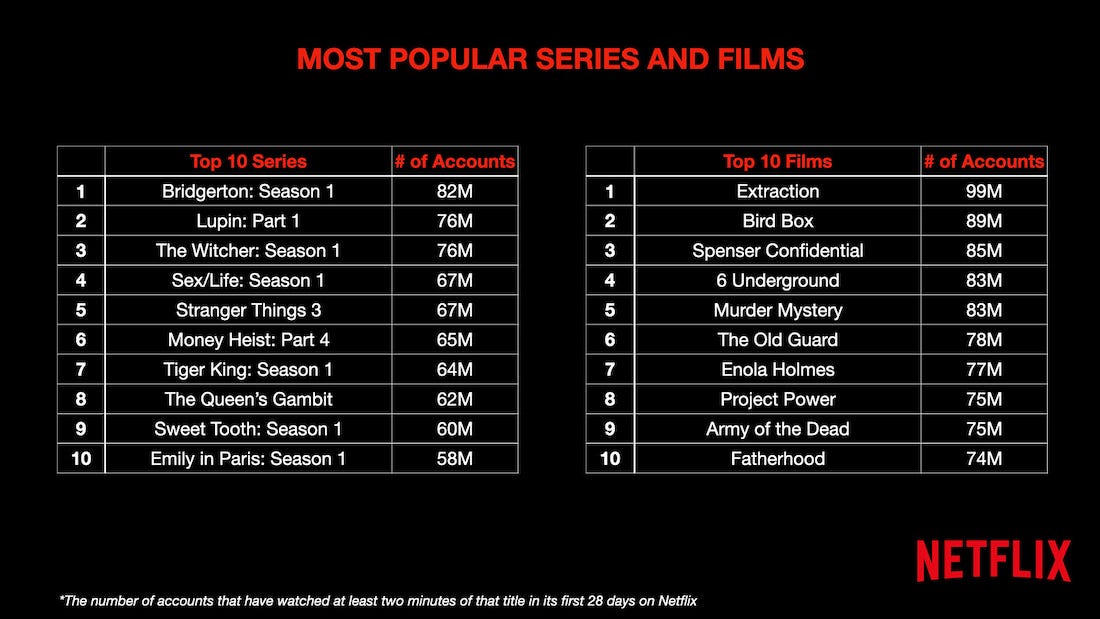Amazon wants to build your tech home
Maybe there should be more responsible innovation when it comes to our homes.
👋 Welcome to FWIW by David Tvrdon, your weekly tech, media & audio digest.
In this edition
Amazon’s idea of a smart home seems cute, until you think about it
For the first time, Netflix shared the actual number of accounts that watched their top movies and shows
Podcasts are most popular in Sweden, happy International Podcast Day
Amazon’s idea of ambient computing has limits

It’s no surprise that the future of computing will be built by one of the tech giants of our age. There has been a lot of talk about metaverse (FB), virtual and augmented reality (Apple), but no one else has done as much to push the idea of ambient computing into reality as Amazon.
Simply put, the idea of ambient computing is that there are no single devices to interact with digitally, rather everything around is one interconnected system. You walk into a room and it knows you are there, instead of looking at your phones on notifications, they will appear on a screen built into the room. You get the idea.
The “battle for your living room” or rather home has been going on for a few years now. In 2019, Google started using the term ambient computing as well. It has the services for such a feature and is building more, though it lacks devices which are a necessary middle step.
Amazon, on the other hand, has the devices and also the services and is pushing forward, even without people in charge there asking themselves “is this a good idea?” when developing a new product.
During its fall event this week the company announced a number of new devices and services of which one stood out, as is usually the case. Remember last year’s Always Home Cam, a security camera in the form of a drone that flies around inside your house.
This year it was Astro, the household robot, called “cute” by some, comes with a initial price tag of $999 (retail price $1,449).
The tech site Motheboard obtained some leaked documents that show how Astro tracks everything you do and some engineers that worked on the project said it is very flawed and “will almost certainly throw itself down a flight of stairs if presented the opportunity”.
Astro was presented as an Alexa on wheels, a companion for the lonely, playing companion for the kids, and also a surveillance machine and guard for an empty home.
As far as Amazon’s thinking goes, Astro is a step forward into the ambient computing future no matter what experts think.
My question is whether it’s a good idea that the next generation of computing that will surround us and be part of our lives as never before is being built by a company and people whose first instinct is to ask whether they can create something and just after that wonder how useful it is.
😞 The Wall Street Journal continues to publish revelations within its Facebook Files series. The latest piece explores how FB internal team has been laying plans to attract preteens that go beyond what is publicly known. FB is also waging a serious PR battle against the reporting and this Sunday it published a point-by-point rebuttal to the Journal’s story on Instagram’s effects on teenage girls. Casey Newton thinks the only way the social network can come out of this less badly is by publishing the whole research. [WSJ]
Instagram is pausing work on Instagram Kids, after criticism from parents, experts, regulators, policymakers, and others. [The Guardian]

📲 2021 has broken the record for zero-day hacking attacks. At least 66 zero-days exploits have been found in use in 2021—almost double the total for 2020, and more than in any other year on record. A zero-day exploit is a way to launch a cyberattack via a previously unknown vulnerability. They are just about the most valuable thing a hacker can possess. These exploits can carry price tags north of $1 million on the open market. The fact we know about so many is a good sign that defenders are catching more of them. [MIT Tech Review]
🪧 Microsoft opens the Windows app store to third-party app stores. Amazon and Epic Games will add the first storefront apps in the coming months. [The Verge]
🚫 China banned all cryptocurrency transactions. China’s central bank said cryptocurrencies were being used for money laundering, illegal fundraising, pyramid schemes and other illegal and criminal activities. [BBC]
📈 TikTok says 1 billion people use the app each month. [CNBC]
🎧 The best headphones for $100 or less. A good selection. [Wired]
🤔 Facebook shares publisher dos and don'ts to avoid content demotion in user news feeds. [The Verge]
😮 A crazy story of a digital media startup that tried to trick Goldman Sachs bankers while impersonating a YouTube executive. The story of Ozy. [NYT]
😎 Netflix reveals how many accounts are actually watching its top titles. [The Verge]
👉 LinkedIn confirms it is testing a new, paid ticketed events service. [TC]
1️⃣ Are Facebook and Google going to ruin newsletters? Are tech giants actually bringing innovation to newsletters, or is it just about capturing a piece of the creator economy pie? [by David Tvrdon]
2️⃣ The future is here and journalists’ research skills need updating. From tracking tech firm data to the use of AI-created “facts” in documentaries – journalists need better tools for research and fact-checking. [by Olaf Deininger]
3️⃣ The Business of Telling Stories. When it comes to saving journalism, it starts with saving journalists. [by Jessica Vomiero]
4️⃣ Are we exaggerating the power of disinformation? We journalists assume it’s a problem, but plenty of independent data says no. [by James Breiner]
[ 📬 Get The Fix newsletter delivered to your inbox every week with the latest insights, news, and analysis about the European media market. Sign up here > ]
🎉 Today is International Podcast Day. (September 30th)
🇸🇪 Podcasts are most popular in Sweden. 47% of Swedes claim they listened to at least one podcast in the last 12 months. Countries with such high numbers are few and far between though. Next to Sweden, only Ireland and Brazil are home to more than 40 percent of participants indulging in podcasts. [Statista]
🎙 Ricky Gervais has released another series of Absolutely Mental with neuroscientist and philosopher Sam Harris. The new season costs $15, or buy a bundle for $20. [Variety]
🎓 It’s time for academe to take podcasting seriously. Someone beat me to writing this op-ed and that’s good, this is much better than I would have written. [Inside Higher Ed]
🤦♂️ Clubhouse has a problem attracting sponsors for its shows. Creators are leaving and starting podcasts. [The Verge]
😲 Ferrari hired former LoveFrom, the agency co-founded by former Apple design chief Jony Ive, as it readies its debut into full electric vehicles. [WSJ]
🎮 You can now use your smartphone as a game controller for Google Stadia.
❓ Poll: Would you be interested in an audio version of this newsletter read by me?
🙌 Thanks for letting me know. If you have more feedback, hit reply and send me a message. I used HandyPolls to create this poll (instructions).
[ Results from the last poll: Where do you usually read this newsletter? 40% iPhones, 30% Android, 30% desktop, with Gmail as top app. ]
🙏 And big thanks to Celine Bijleveld who helped me edit this newsletter. You can follow her on Substack here.











